Report

Резюме
- Sustainability investments rose 60% to $3.2 billion in the first half of 2019 over the same period a year earlier.
- Total private equity deal value in 2018 topped $10 billion for the second year in a row, rising sharply in Vietnam and Indonesia.
- Four young companies in the region have surpassed $1 billion in value since January 2018, bringing the total number of unicorns to 14.
Despite warnings of a looming recession, a two-year surge of investment in Southeast Asia shows no sign of slowing. Venture capital firms in the region raised more than US$500 million in the first half of 2019, and private equity investors remain on a path to double the cumulative investment since 2017 compared with the previous five years.
Southeast Asia’s fast-growing start-ups are a powerful draw for investors. In the past year, the region gave rise to four additional unicorns—new companies that rapidly achieve market valuations of $1 billion or more—bringing the total in the region to 14 (see Figure 1). Coming up fast behind them, the top five start-ups ranked by cumulative funds have garnered more than $1 billion in financing.
Southeast Asia has given rise to 14 unicorns with a combined market value of $57 billion

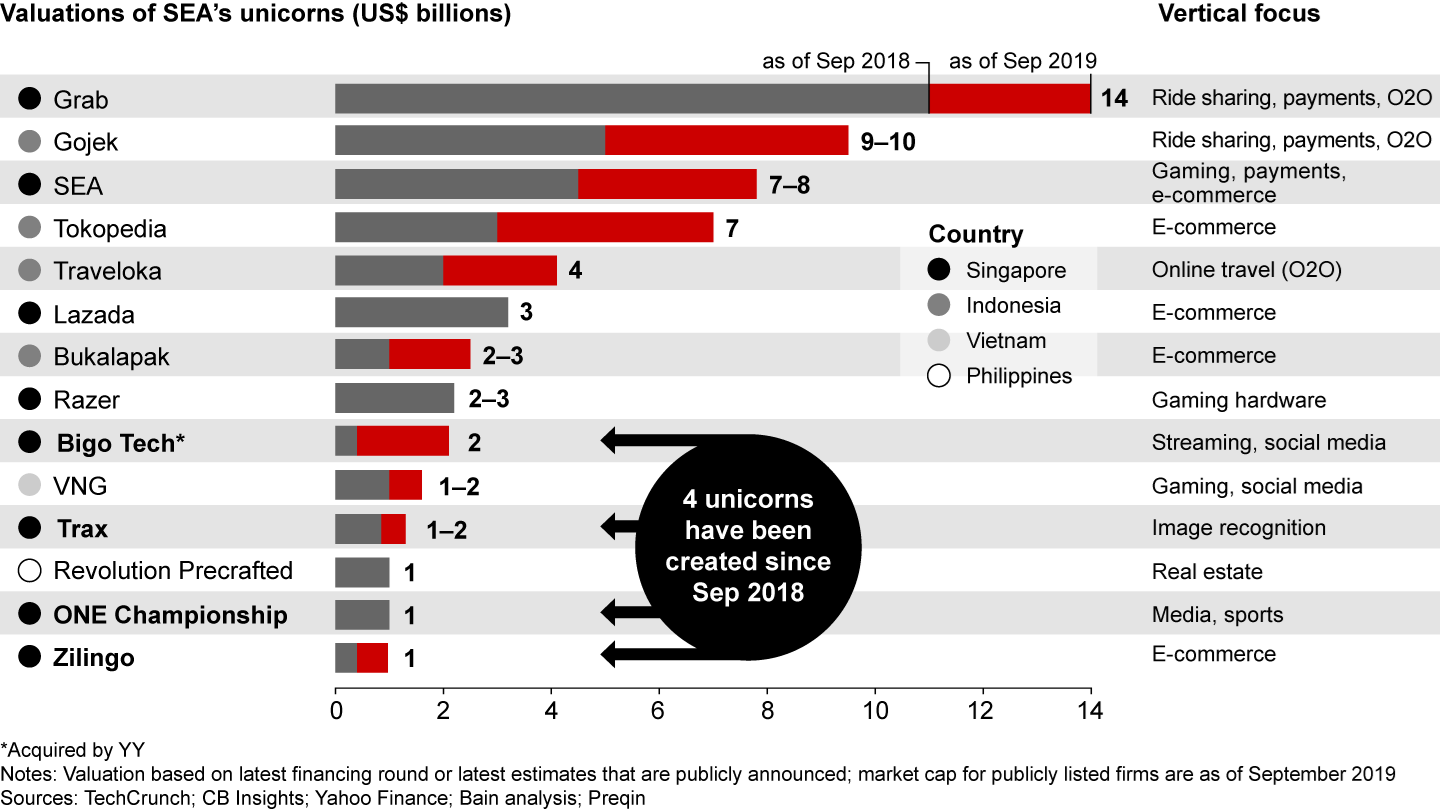
The rapid step-change in private equity and venture investment across Southeast Asia coincides with a significant increase in sustainability investing—capital flowing to companies that contribute to environmental and social progress (as defined below). Ten years ago, for example, most large investors in Southeast Asia targeted investments in primary industries such as oil and gas, mining and agricultural commodities. Today many are funding innovative business models that address environmental and social needs. Examples include companies developing renewable energy projects, platforms that provide microbusinesses with access to financing and markets, and for-profit hospital networks that offer underserved populations better access to healthcare.
In developing countries, the range of potential sustainability investments is arguably broader than in developed countries. Based on a definition adapted to developing countries, sustainability investing in Southeast Asia has rapidly gone mainstream. Of all private equity deals in the first half of 2019, 56% involved companies that met our sustainability criteria for developing countries, up from 30% in 2017. The total deal value of sustainability investments for the first half of 2019 was $3.2 billion, up 60% over the first half of 2018, and is on track to surpass 2018 (see Figure 2).
Sustainability investing goes mainstream—56% of 2019 deals contribute to environmental or social progress

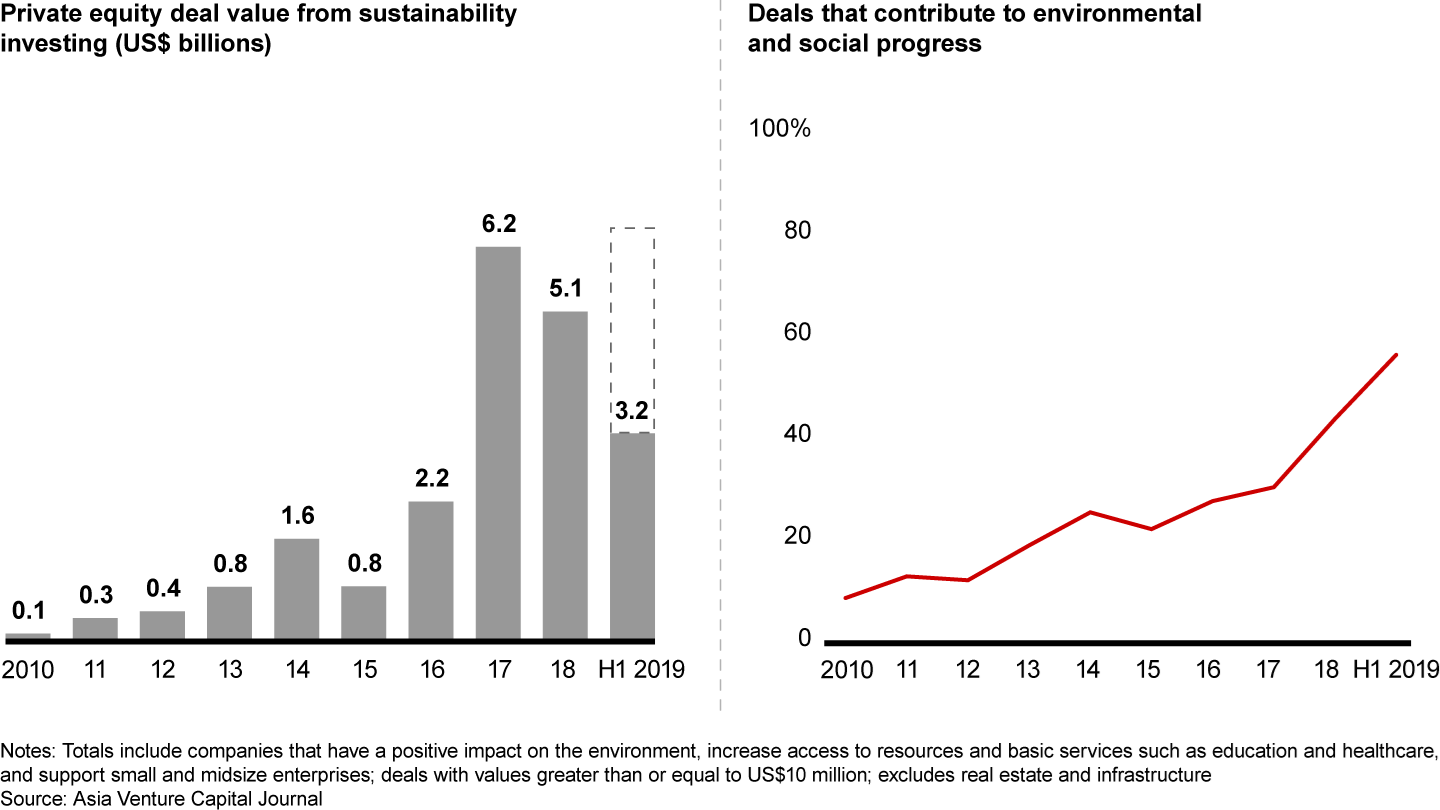
Strong investment momentum
Private equity deal value in Southeast Asia totaled $13 billion in 2018, the second year in a row that it topped $10 billion (see Figure 3). Investor interest in Vietnam and Indonesia soared, with these two countries representing 50% of total deal value, up from 11% in 2017. Technology and Internet companies dominated the investment landscape in 2018, constituting 63% of total deals, up from 37% in 2017. Healthcare and financial services also generated strong deal flow.
Southeast Asia private equity deal value exceeded $10 billion again in 2018

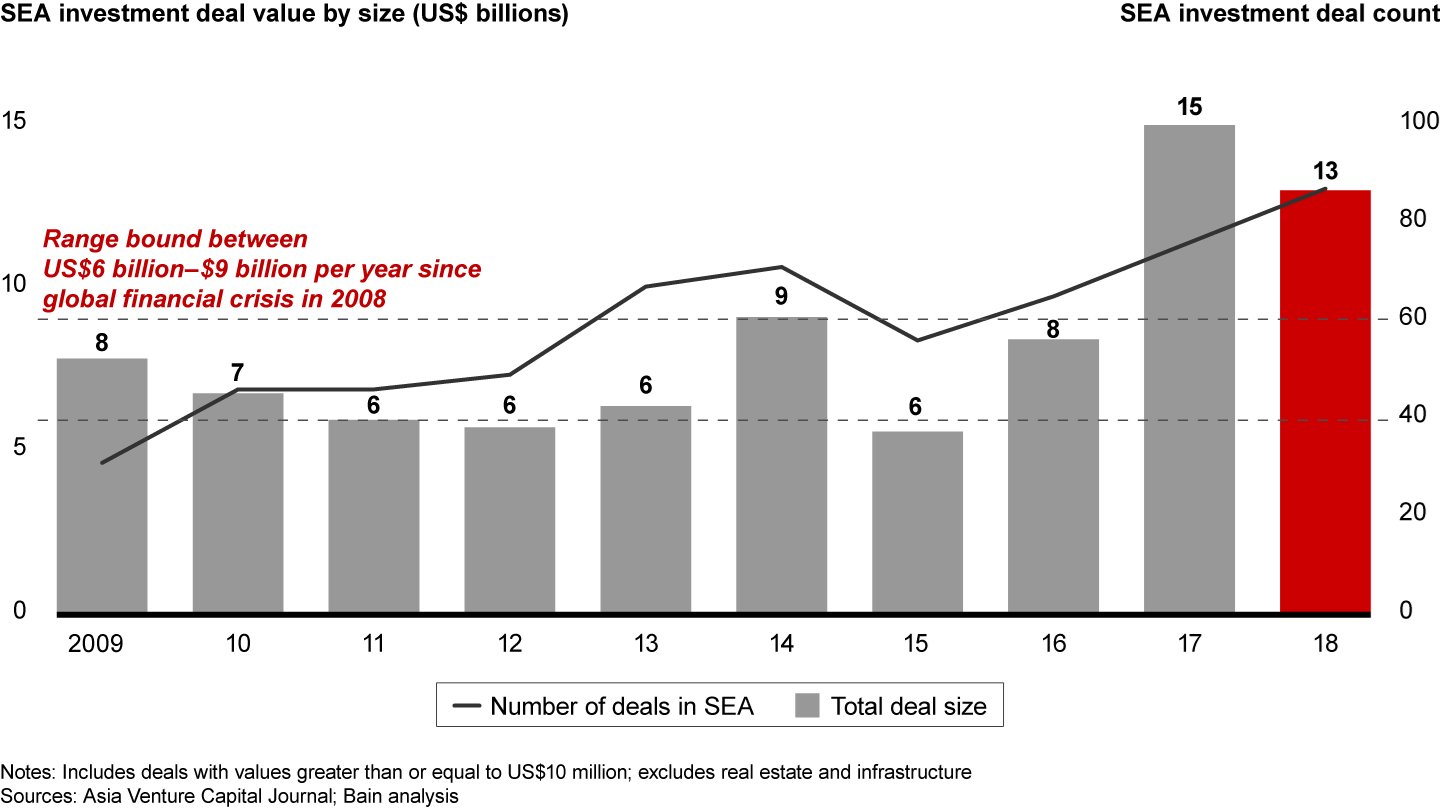
A steady flow of capital to seed and early-stage companies broadened and deepened Southeast Asia’s venture capital ecosystem. In 2018, for the fourth year running, 300 start-ups or more received first-round funding, bringing the investable base of start-ups in the region to nearly 1,800 since 2011 (see Figure 4). The top 20 start-ups ranked by funding (not including unicorns) raised more than $1.5 billion from investors between 2018 and mid-2019, another signal of the region’s strong investment momentum (see Figure 5).
Southeast Asia continues to create more than 300 start-ups a year that receive first-round funding

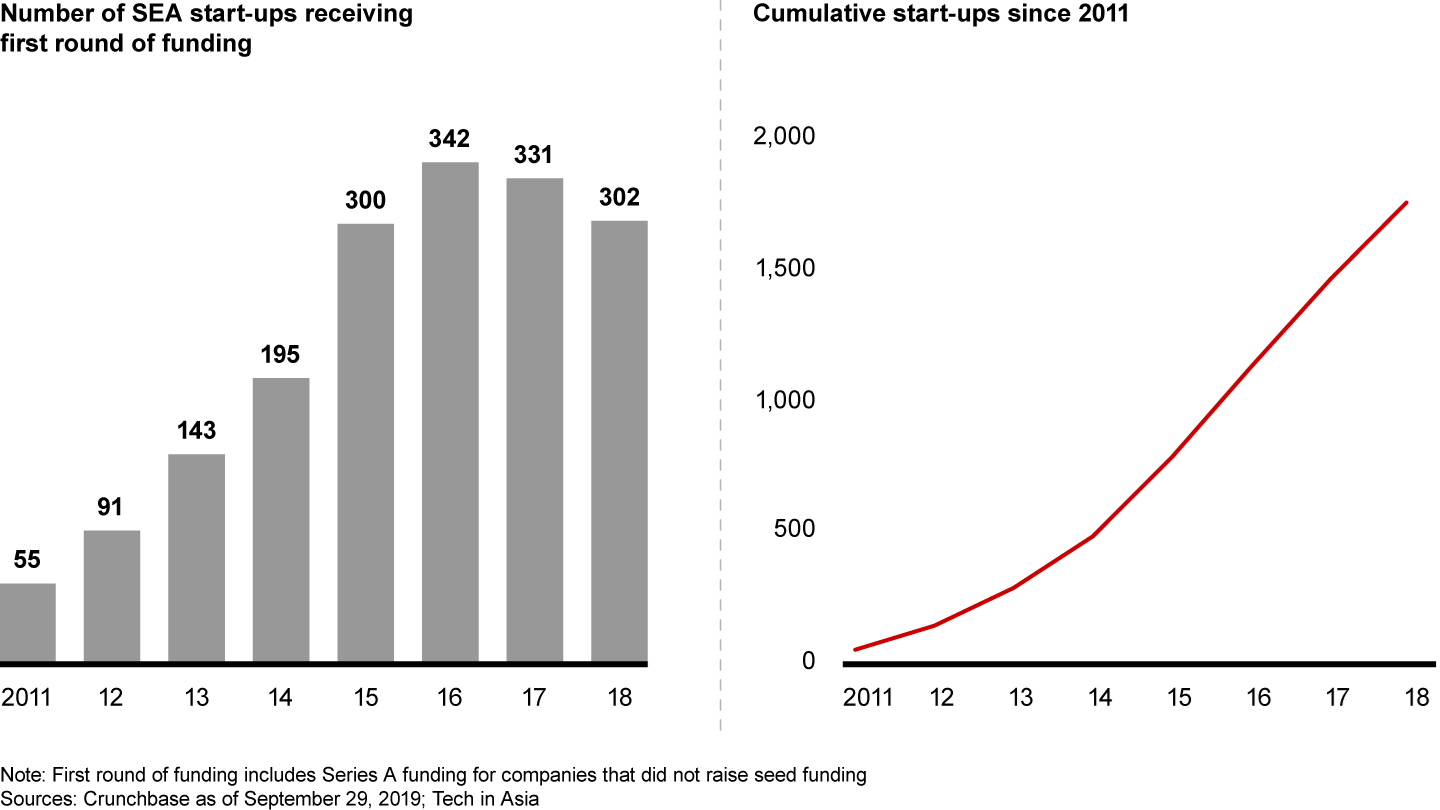
Beyond the unicorns, the 20 largest start-ups by cumulative fund-raising raised over $1.5 billion from 2018 to mid-2019

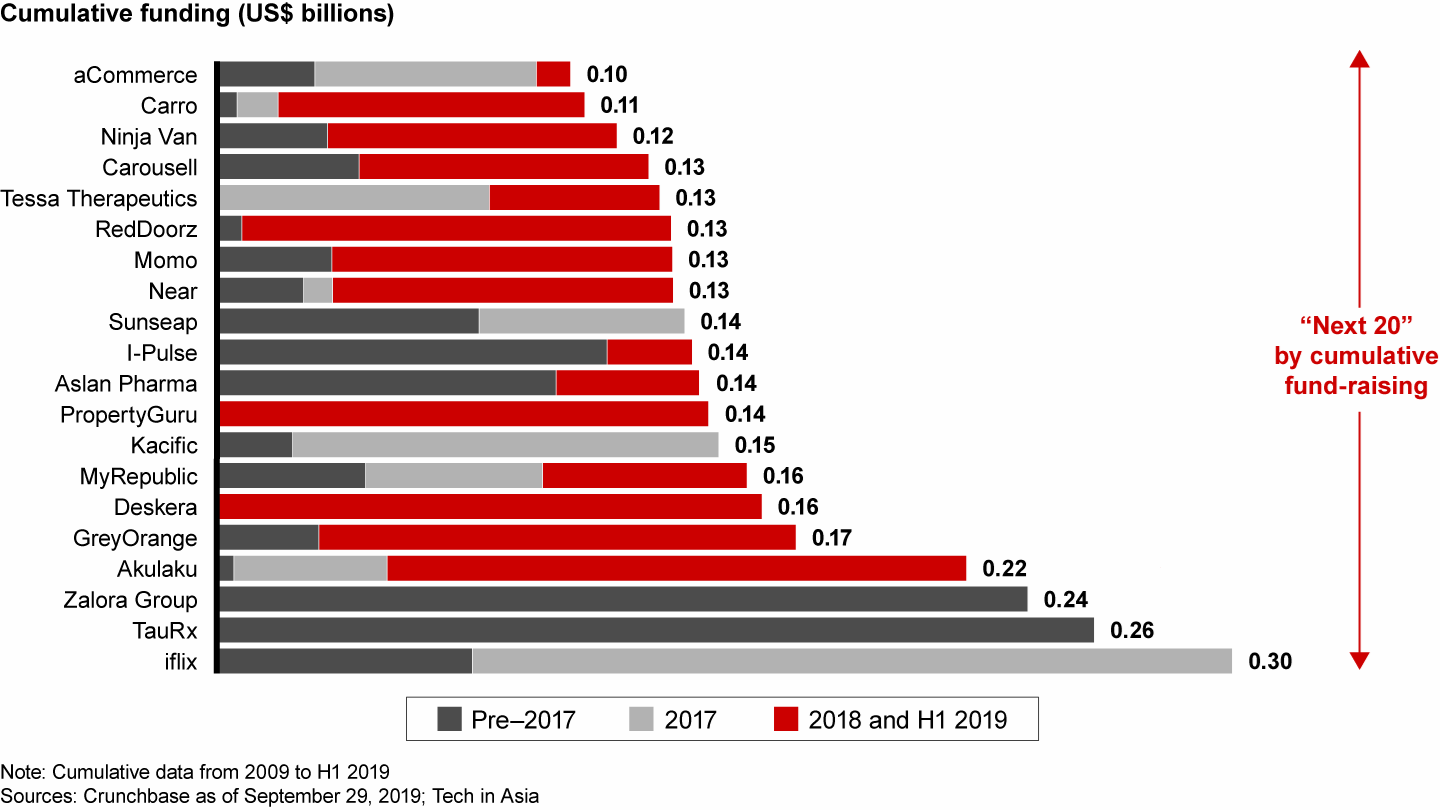
Between September 2018 and September 2019, four start-ups passed the $1 billion valuation mark to become the latest unicorns, including Bigo Tech (streaming and social media), Trax (image-recognition), ONE Championship (media and sports) and Zilingo (e-commerce). Southeast Asia’s unicorns now have reached a combined market value of about $60 billion.
Sustainability investing takes off
Socially responsible investing is on the rise globally, fueled by public concern about global challenges such as climate change, pollution, deforestation and social inequality. Consumers and shareholders are increasingly demanding that companies expose ethical issues linked to their investments. That concern sparked the first wave of sustainability investing a decade or more ago as funds sought to mitigate financial and reputational risks.
Now, investors are realizing it may cost them more to ignore environmental and social criteria in their investments, and limited partners are putting pressure on global fund managers to incorporate environmental, social and governance (ESG) criteria into their investment processes (see Figure 6). As a result, a growing number of funds are building portfolios of companies that meet Principles for Responsible Investment (PRI), supported by the United Nations—and developing the in-house capabilities to help them grow.
General partners in Southeast Asia feel pressure to pay attention to sustainability issues when investing

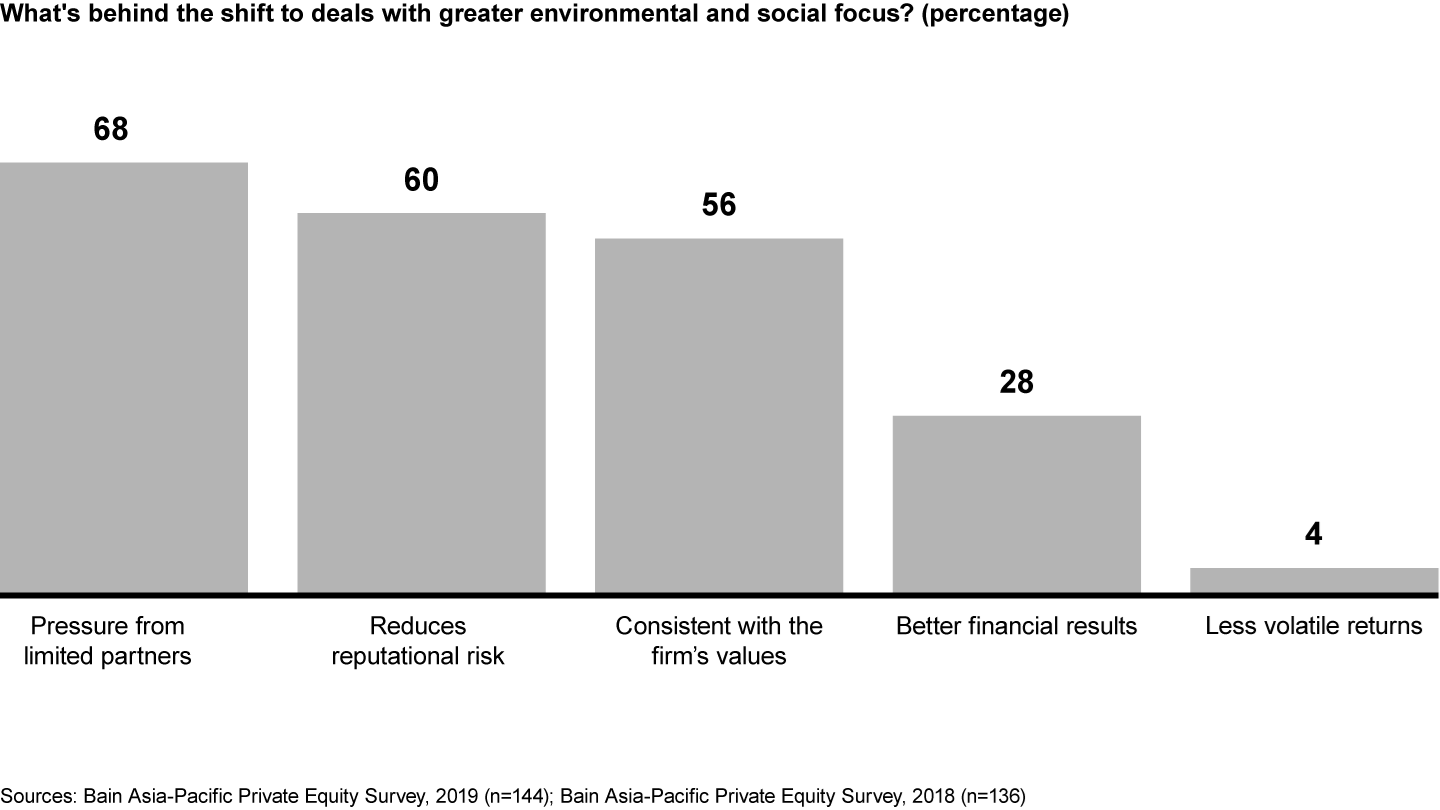
For this report, we defined a sustainable investment as one that fuels growth (as opposed to a mere change in financial ownership) and meets at least one of three criteria:
Improves the environment. Includes investments in clean energy, water purification, pollution controls, waste reduction, low-carbon transportation, sustainability fisheries and energy from waste.
Increases access to basic resources or services. Encompasses investments in platforms to expand and improve access to vital services that often are lacking in developing countries and hinder growth, such as education, healthcare and e-wallets for low-income segments of the populations with no access to traditional banking services.
Provides microbusinesses access to finance and markets and promotes social mobility. Includes microfinancing or digital sales platforms for small businesses that help reduce poverty and promote upward economic mobility of business owners.
Several forces are accelerating the shift to sustainability investing in Southeast Asia. Global private equity funds are rapidly adopting ESG criteria and shifting their investment focus. And as global awareness and commitment to sustainability grow, private businesses increasingly see big opportunities in Southeast Asia. The region’s sovereign investment funds and government-linked funds, which are among the world’s most active sustainability investors, are another powerful force accelerating the shift. Funds such as Temasek and Khazanah have helped expand the sector, deploying patient, long-term capital to develop successful business platforms in areas such as healthcare. As the region’s largest funds take the lead on embedding sustainability goals into their strategies and championing ESG-focused investing policies, they are setting the tone for portfolio companies as well as private equity funds.
In a recent Bain survey, 96% of investors in Southeast Asia said they had accelerated their efforts to incorporate environmental and social criteria into their investment decisions. Large global private equity funds are among the most committed. KKR, for example, incorporates ESG diligence into all its deals in the region in keeping with its global policy. Global investment group EQT, headquartered in Sweden with roughly $45 billion in assets under management, keeps an ESG scorecard for all its portfolio companies and tracks ESG performance globally. However, many smaller and medium-sized funds are lagging in implementation, according to the survey. Only 14% of private equity companies in Southeast Asia fully incorporate sustainability criteria into investment decisions or improve the environmental and social impact of their portfolio companies (see Figure 7).
Investors in Southeast Asia are committed to sustainability investing but are at an early stage

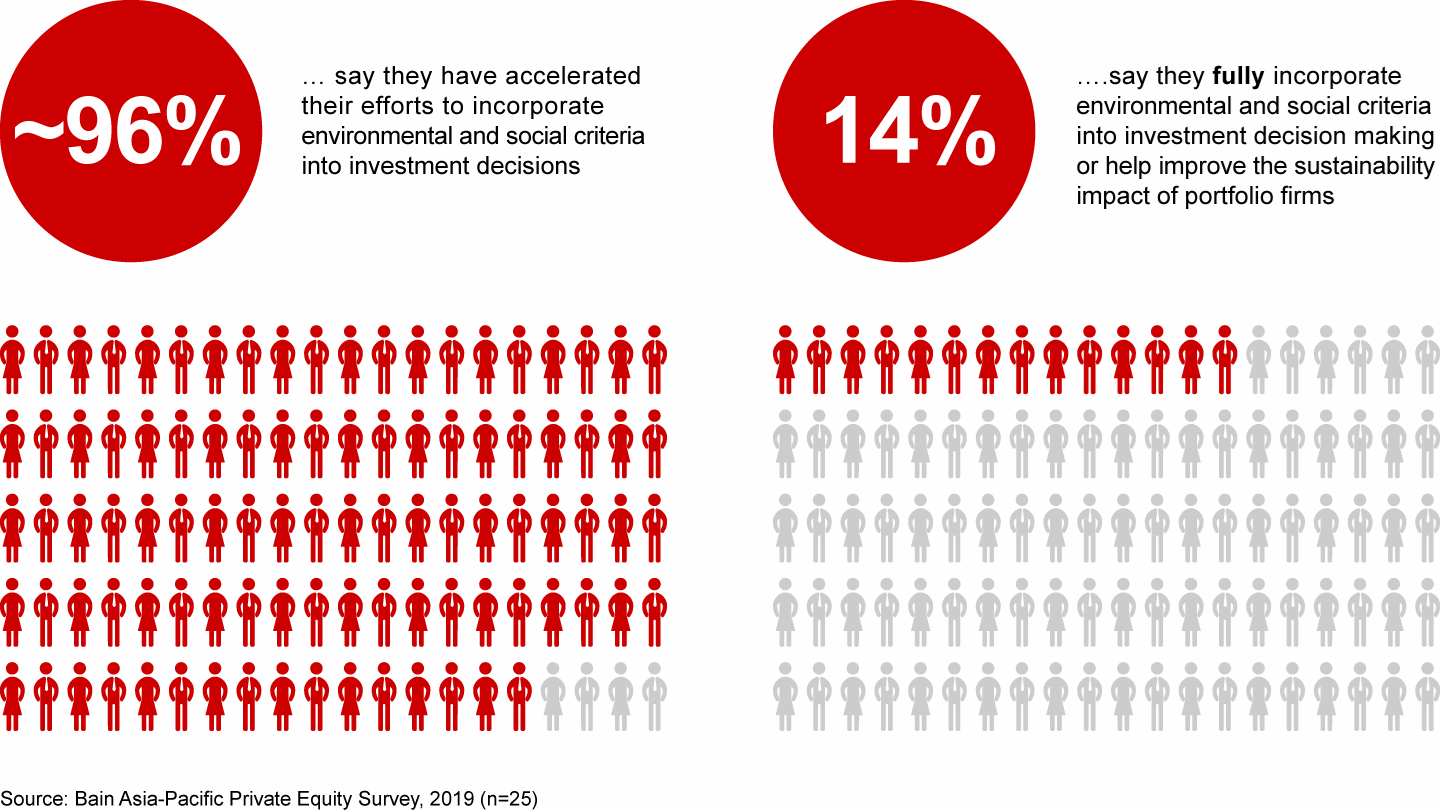
Importantly, a growing number of studies show that funds that incorporate ESG goals into their strategies perform as well as or better than other portfolios. That’s accelerating the shift to sustainability investing. The number of fund managers who have signed the United Nations-supported PRI has grown to more than 2,660, from 1,200 in 2013. The $82 trillion in assets under management by these signatories increased by a compound annual rate of 19% in the same period. For Asia-Pacific exits between 2014 and 2018, Bain research shows the median return multiple for deals that either involved impact funds or focused on sectors that score high on ESG—including clean tech, ecology, renewables, education, water and waste—was 3.4, compared with 2.5 for other deals.
Investors seeking recession-resilient sectors also are drawn to sustainability investing. Many funds are betting on building long-term businesses that can weather a downturn as opposed to seeking a quick improvement in the performance of existing businesses.
The majority of investors in these deals are attracted by business opportunities with solid returns that happen to address environmental problems or social needs. Impact investors, a much smaller subset of sustainability investors, by contrast, intentionally build portfolios of companies to achieve environmental or social goals in addition to financial returns—and they systematically measure their impact.
It’s an important distinction, as investors and the media often use sustainability and impact investing interchangeably, blurring the boundaries between the two. For the sake of clarity, we distinguish between ESG-focused investors and impact investors as follows:
ESG opportunity seekers. Funds that seek solid business opportunities to invest in companies that support environmental and social progress in sectors such as renewable energy, waste management, education and financial inclusion. Some work with their portfolio companies to increase their impact, but they don't necessarily measure it.
Impact investors. Funds that intentionally invest only in assets with significant social and environmental impact. Impact investors build ESG capabilities at portfolio companies and develop performance indicators to measure ESG impact in addition to financial returns.
As global investors pile into Southeast Asia and lead some of the biggest buyout deals, they are bringing their ESG-investing policies and impact investing programs to the region and creating a multiplier effect. According to a report by the Global Impact Investing Network (GIIN), impact investment funds channeled more than $750 million to Southeast Asian companies between 2013 and 2017.
In December 2018, KKR made its first global impact investment in Southeast Asia, committing up to $33 million for a stake in Barghest Building Performance, a Singapore provider of energy-saving solutions. The company uses sensors, software algorithms and equipment controls to cut electricity consumption by up to 40% in the air-conditioning systems of industrial and commercial customers throughout Asia. KKR’s impact investing strategy focuses on global opportunities where financial performance and societal impact are aligned and where there is no trade-off between the two goals.
The most striking sustainability trend in Southeast Asia, however, is the growing number of ordinary deals across the region that involve companies with a positive environmental or social progress (as defined for developing countries). In 2018, private equity funds invested more than $6 billion in sustainability assets in Southeast Asia, making up 41% of deal value, compared with 1% in 2010.
A spike in co-investing or “clubbing” with investors that have longer time horizons is fueling sustainability investing. Sustainability deals attracted a higher number of average investors—4.6 per deal, compared with 2.6 for other deals (see Figure 8). AI Grid Foundation, a nonprofit based in Singapore that codeveloped a community-based model to deploy decentralized renewable energy resources, raised $20 million in a 2018 round from more than a dozen private equity funds, venture capital funds and corporates. Similarly, when Funding Societies, which owns and managers an online peer-to-peer lending platform for small business owners, sought funding in 2018, six investors teamed up to provide $25 million. More than 60% of all sustainability deals include a long-term investor (pension fund, government, corporate, development or family office) in addition to a private equity and venture capital investors.
Investors in Southeast Asia join forces as transactions grow larger, especially on deals contributing to environmental or social progress

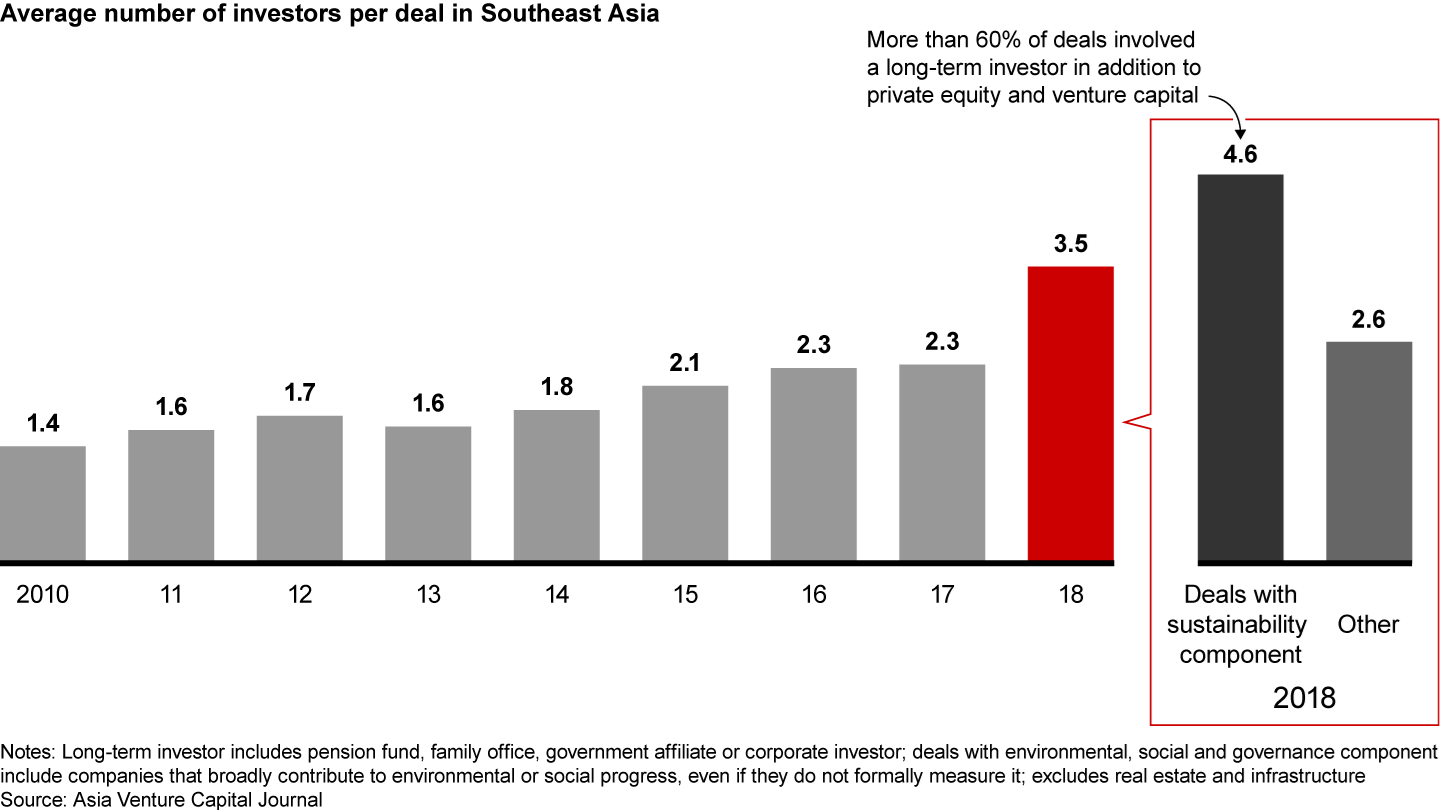
Southeast Asia’s sustainability leaders
Southeast Asian sovereign wealth and government-linked funds are at the forefront of sustainability investing, both on a regional and global level. Singapore’s Temasek, which now has approximately $300 billion in portfolio value, pledged in 2014 to advance a sustainability agenda. And in 2015 large-scale air pollution related to seasonal fires in Southeast Asia prompted management to increase Temasek’s commitment to work with portfolio companies and partners on environmental issues and social inclusion, giving a strong signal to the market. In particular, the sovereign investor has pledged to reduce pollution and waste at portfolio firms and halve carbon emissions across the entire group by 2030.
In 2016 Temasek set up the Sustainability & Stewardship Group outside the investment group, with the mandate to lead the firm’s efforts in these areas. Temasek’s initiatives include managing and integrating ESG factors into the investment analysis and encouraging portfolio companies to adopt responsible and sustainable practices in their businesses. The group also invests in capability building, to address long-term challenges affecting Singapore and the region, and takes direct stakes in impact funds and companies.
Temasek’s Enterprise Development Group launched a platform-building strategy to support social progress when it founded Sheares Healthcare. Sheares acquires hospitals as part of a healthcare platform in the Asia-Pacific region and uses innovative technologies to improve hospital processes and develop new care delivery models.
Khazanah, the national wealth fund of Malaysia, is another force accelerating socially responsible investing in Southeast Asia. Between 2015 and 2017, it raised $50 million for sustainable development investments. Khazanah incorporates environmental, social and governance factors into its investment analysis, decision making and asset ownership. To measure the sustainability and social inclusion impact of its investments, the fund created a framework to define indicator benchmarks and has deployed it in 21 portfolio companies constituting 75% of its assets. Its sustainability holdings including Cenviro, a Malaysian integrated environmental waste management solutions provider, and Cenergi, a company that invests in biogas, biomass and energy efficiency projects in Southeast Asia.
Southeast Asian start-ups also are accelerating the shift to sustainability investing by building environmental and social businesses. Halodoc, an Indonesian digital health platform with venture funding, for example, offers healthcare teleconsultations over a phone app in a market that lacks primary health clinics. Topica Edtech Group cooperates with 16 universities in the US, the Philippines and Vietnam to provide high-quality online degree programs in Southeast Asia. And Singapore’s Validus, which is backed by Temasek and others, provides short-term loans to small and midsize enterprises that would struggle to get working capital financing from traditional banks.
Investing in the future
Pressure is growing on investors worldwide to pay more attention to environmental and social factors as they seek investments and manage their portfolios. As sustainability and impact investment accelerates in Southeast Asia, private equity firms investing in the region that lack a vision or investment model that incorporates ESG criteria may find themselves at a disadvantage.
For many fund managers, however, integrating sustainability criteria into the business is challenging. How do you measure environmental and social progress or impact? What new processes should funds add to diligence and portfolio management?
An important first step is aligning on the right investment model, based on a fund’s values, capabilities and sector interest. Next, fund managers can select criteria and processes to guide a new set of behaviors:
- Determine how important ESG practices will be in screening potential investments. The United Nations’ Sustainable Development Goals provides a framework with 17 clearly defined objectives, which can help funds focus on tangible environmental and goals.
- Set guidelines about how to monitor investments in terms of ESG compliance. Develop sustainability metrics for portfolio companies and decide how often the board should review ESG performance. Determine actions to take if portfolio companies deviate from good practices, such as exiting the investment, setting targets for the CEO or addressing the issue directly.
- Decide whether to measure and report ESG performance alongside traditional return metrics.
In the coming years, a growing number of general partners will incorporate environmental and social considerations into their strategies. Those that do will set themselves apart as investors who seek strong returns while promoting sustainability and more balanced economic development.
Suvir Varma is a senior advisor, and Alex Boulton is a principal, with Bain & Company’s Global Private Equity practice. They are based in Singapore.